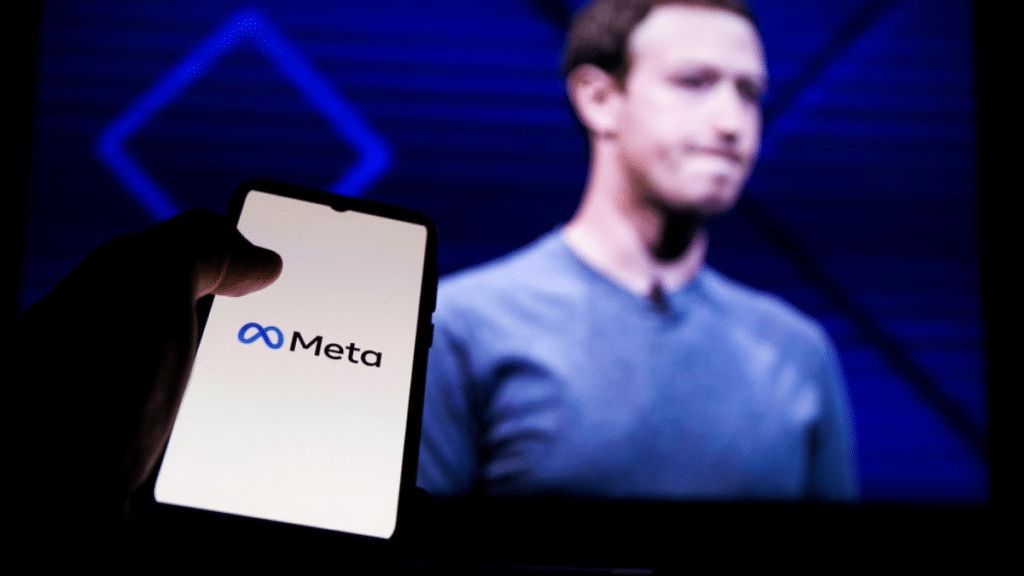FTC Heads To Trial To Break Up Meta: What You Need To Know
Cristiano Lima-Strong / Apr 11, 2025
The Meta logo on a smartphone in front of an image of CEO Mark Zuckerberg.
The US Federal Trade Commission (FTC) on Monday will kick off its trial against Meta over allegations that the tech giant has an illegal monopoly over social media, the culmination of a yearslong effort by US government officials to rein in the company’s vast market power.
At the core of the case is whether the Silicon Valley giant should be forced to spin off Instagram and WhatsApp. US officials allege the company sought to neutralize these potential competitive threats by scooping them up via acquisitions a decade prior.
As the trial approaches, here is what you need to know:
How we got here
The FTC sued Facebook in December 2020 during the final days of the first Trump administration, alleging that the company had maintained a monopoly over what the agency called the “personal social networking” market. The agency’s leadership voted to authorize the complaint on a bipartisan basis, 3-2, though two of the agency’s Republican members objected.
Judge James E. Boasberg of the US District Court for the District of Columbia dismissed the federal government’s case and a parallel lawsuit by a coalition of state attorneys general in June 2021, finding that the government had failed to make its case that Facebook possessed monopoly power. The agency refiled its lawsuit in August 2021, then under the leadership of Democratic Chair Lina Khan.
In January 2022, the judge ruled that the amended complaint could proceed, finding that the agency offered “more robust” evidence to sustain its case. Then, in April 2024, Meta filed for a summary judgment, but in November, it was largely denied, and the judge ordered that the case go to trial.
What to expect
The trial is scheduled to start Monday morning and last for several months, wrapping up on July 3, the day before US Independence Day. The two sides will have the chance to present their cases, offer evidence, and call on witnesses to testify. Meta CEO Mark Zuckerberg, former COO Sheryl Sandberg, and other executives are expected to appear, according to news reports, though it is unclear how much of the sessions will be closed to the public.
What’s at stake
If the federal government wins its case, as it did against rival tech giant Google in its antitrust lawsuit over online search, it could ask the court to break up Meta. In other words, the judge could order the giant, which rebranded as Meta in 2021, to spin off WhatsApp and Instagram.
Such a move would mark the most significant court ruling over social media in history, and could dramatically alter the landscape of the internet. But first, the FTC will need to convince the court that Meta has maintained an illegal monopoly. If it does, the judge could move to hold a separate trial over what remedies should be taken to address the monopoly, as the courts have done in the Department of Justice’s case against Google.
Key legal questions
The court will weigh the government’s complaint against US federal antitrust law, namely Section 2 of the Sherman Act, which prohibits monopolization. According to a Justice Department overview, demonstrating monopolization requires showing “(1) monopoly power and (2) the willful acquisition or maintenance of that power as distinguished from growth or development as a consequence of a superior product, business acumen, or historic accident.”
That sets up a key question at the trial: Does Meta actually have a monopoly over its relevant market?
The FTC has argued that the giant has a monopoly over what it calls “personal social networking services,” which it defined in its amended complaint as “online services that enable and are used by people to maintain personal relationships and share experiences with friends, family, and other personal connections in a shared social space.”
The agency has argued that such services are distinct from platforms like Google-owned YouTube, which it said is “primarily for passive consumption of specific media content,” and TikTok, which it called a “content broadcasting and consumption service.”
Meta has rebuffed these assertions and argued that it faces fierce competition for people’s attention from a broad array of online services. The company has called FTC’s definition of “personal networking services” a “gerrymandered market” that ignores “many of the most popular activities people engage in on Facebook and Instagram.”
Another key question will be whether Meta abused its alleged monopoly power by acquiring Instagram and WhatsApp. The FTC is set to argue that the acquisitions were “exclusionary” in nature and intended to cut off nascent competitors that challenged their dominance. By doing so, the agency alleges, Meta harmed consumers and degraded the quality of the products.
In response, the company has argued that the FTC’s claims about consumer harm are “speculative,” and that its acquisitions have improved its offerings and created benefits for consumers.
The timing of the government’s challenge of those acquisitions is also expected to be a major factor in how the court rules. The FTC has argued that Facebook’s acquisitions of Instagram in 2012 and WhatsApp in 2014 should have been blocked at the time and should be unwound, but the tech giant has argued that it is too late for the government to challenge them now.
What the court has said
Boasberg, the judge presiding over the case, bluntly rejected the FTC’s initial lawsuit in 2021, but since then, he has been more receptive to the government’s claims in its amended suit.
Still, Boasberg wrote in his decision to let the case go to trial last year that the agency “faces hard questions about whether its claims can hold up in the crucible of trial” and that its “positions at times strain this country’s creaking antitrust precedents to their limits.”
The X factor? Trump, of course
The FTC is now led by Chair Andrew Ferguson, who was put in charge after Donald Trump retook the White House in last year’s US presidential election. While Ferguson has insisted he has no plans to let Big Tech companies off the hook, he has declined to rule out following directives from President Trump regarding tech cases. The president, in February, issued an executive order asserting his “control” over most of the executive branch, including independent agencies like the FTC. Last month, he fired the agency’s two Democratic commissioners, who have called the move illegal and are suing to reverse it.
Last week, the Wall Street Journal reported that Meta has lobbied Trump to have his administration settle its lawsuits with the FTC and stave off the upcoming trial.
There has been no public indication by the agency that it is entertaining such a move, and both Meta and the FTC have filed a series of motions in recent days in preparation for the trial.
But even after the trial kicks off, Trump could still push the agency to seek a settlement, including if the federal government wins its case in court. The specter of a potential Trump intervention will likely loom over the proceedings until the matter is fully settled.
Authors
